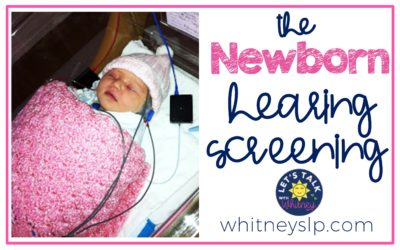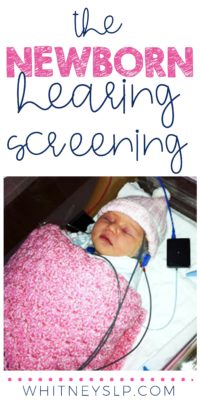I’ve been a mommy for a week now, and I have to tell you…it’s the greatest thing I’ve ever accomplished. The past week of having and bringing home a baby has brought on all kinds of emotions. I start off each morning thinking I couldn’t possible love her more, and then she sneezes, or smiles, or scrunches her nose, and my heart soars! I’ve spent so much time this week just looking at my little girl. Imagining how her life will go. Holding on to every little move she makes. And Praising the Lord for the miracle that she is. I’ve also spent a lot of time thinking about the parents of my students at school. As much as I thought I could empathize with some of them before, I realized this week how unbearable it would be to hear that something was “wrong” or “abnormal” or “delayed” or “disabled” or “impaired” with my child. Because in mine and her daddy’s eyes, she is undeniably perfect. As a service provider, I know the benefits of early intervention, and thus recognize the importance of hearing that there might be a developmental concern in a child. But until I became a parent myself this week, I couldn’t fully grasp the concept of what parents go through as they observe the developmental progression of their child and watch them grow and learn. Testing for “norms” starts from the moment the child is born when the doctor assesses them medically. And then within a day of their birth, with another test: the newborn hearing screening.

Auditory Brainstem Response (ABR)
Halle Jane was less than 24 hours old when an Audiologist came to our hospital room to test her hearing using ABR (Auditory Brainstem Response). As an SLP, I knew about the test: its importance, what it entails, and what the results mean. And even though I had tons of background knowledge, I still found myself holding my breath until the Audiologist said she passed.
She’s perfect no matter what.
The truth is, had she failed the hearing test, I would’ve still thought she was perfect. And then we would’ve figured out the next steps for us after that. But it did get me thinking about those families who are told their children didn’t pass. Or the families that are told later on that their child has a speech impairment, or language delay, or even Autism. According to “the norms,” these children might have “delays” or “disabilities” or “impairments,” but they are still perfect individuals, and helping these children is why I entered this field. Although I have always held a special place in my heart for those children with disabilities, becoming a parent has given me an even deeper love and appreciation for their families.
Early Childhood Development:
Even though I typically post on the school-aged population, I’m going to take advantage of the play-by-play action I have with my little girl and do some occasional posting on childhood development. As an SLP, I know I can use the refreshers, and as a mommy, I hope diving back in to normal child development will help me celebrate the developmental milestones Halle Jane reaches, and alert me to any difficulties she, or any of my students, may have.
So here we go: After the hearing screening, the hospital gave be a nifty magnet with hearing norms for children birth-12 months. The information was provided by Florida Newborn Screening: Children’s Medical Services, and can be found at www.cms-kids.com
It should be noted, however, that the following norms are averages, and some children may meet these milestones before or after the ages listed and still be considered “average.” Should you have any concerns about normal childhood development in your child, you should always seek medical advice from your pediatrician.
Birth to 12 Months Hearing Norms:
Birth to 3 months:
Jumps or blinks to sounds
Stirs or wakes up when someone talks
Produces vowel sounds such as “ooh, ahh, ehh”
Is soothed, quiets down, or smiles if spoken to
3-6 months:
Looks for sounds with eyes
Responds to voices even if they cannot be seen
Enjoys sound toys
Enjoys music
Begins to babble (mama, dada, baba, etc)
Produces several different sounds, squeals, chuckles
6-9 months:
Turns head towards sounds (localizes to sound)
Responds to his/her name
Begins to imitate speech sounds
Understands “no-no” or “bye-bye”
9-12 months:
Repeats simple words or sounds
Uses “mama” or “dada” correctly
Responds to music and singing
Points to toys or objects when asked
Do you have any experience with the newborn hearing screening? Oh-and I wanted to share our birth announcement with you guys, too:







COngrats on the bundle of perfectness! I'm sure the new perspective is going to change a lot about the way you approach therapy!
Jenna
Thanks, Jenna!
Welcome to the Mommy Club, Whitney! She is perfect!!!! It is truly something that you never understand until you become a mom, and I know how amazing it is…even eleven years later, your heart will soar 🙂 It is SO important to always remember that the kids we work with are someone's perfect baby, no matter what challenges they face. I look forward to watching Miss Halle Jane grow on your blog!
Jenn
Crazy Speech World
Thanks, Jenn! I'm enjoying showing her off 😉
I totally agree with Jenn and Jenna! Being a Mommy is amazing and it definitely changes your perspective on therapy and your students! It's so nice to actually watch typical development happen on a day to day basis as well. Congrats!
Thanks, Carrie!
Beautiful! Both your little girl and your post!
Congrats! She's such a cutie, and I love the name! Do you pronounce it hal-ee or hail(hay)-lee? I actually just applied for a job to be a newborn hearing screener/ Audiologist assistant, so it's great to see this post. 🙂
Thanks, Trina! We pronounce it Hal-ee (rhymes with Callie) like Halle Berry! Good luck with the new job…I'm sure you will love it!
I love those newborn hearing screening pictures. I am one of those parents who received the news of a "refer" on the newborn hearing screening program. It is the sort of news that leaves one in a bit of a shock – and also a scramble for information. My son received his hearing aids at the age of 4 months.. he is now six years old, reads at a 4th grade level, plays the piano, and has unbelievable speech and language skills. He has a moderately severe to severe hearing loss. Early intervention makes a massive difference!
Hi! Thanks so much for your comment. I LOVE hearing about success stories! You are so right…early intervention makes all the difference in the world! I'm so glad your son is doing so well…PS: I play the piano too! 🙂
It’s nice to see how much progress she had! Isn’t it amazing that she could already say simple words on her twelfth month? So, how’s she doing now? I bet she have already learned so many words and could communicate what she wants through simple phrases. Cheers!
Kirk White @ MedCare Pediatric